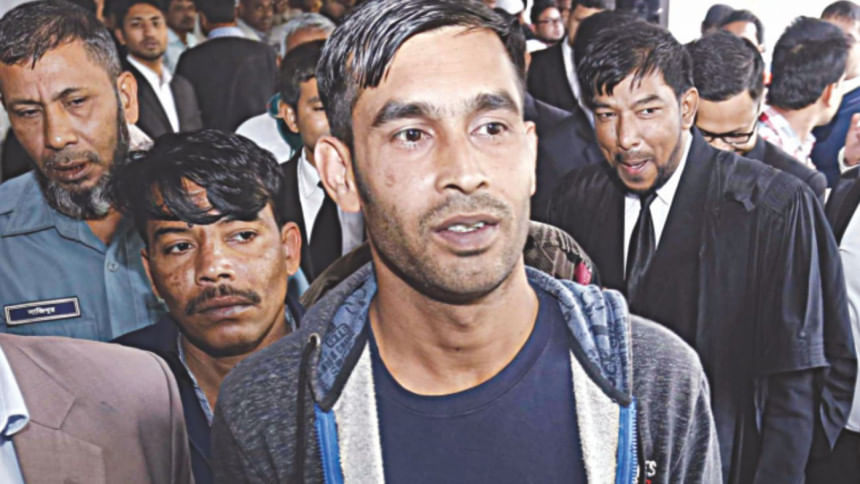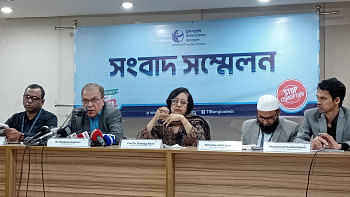Wrongful Imprisonment of Jaha Alam ACC officials to blame

Investigation officials of the Anti-Corruption Commission are responsible for wrongly implicating jute mill worker Jaha Alam in graft cases, which resulted in him languishing in jail for three years, says an ACC probe report.
“It seems that the mistake of identifying Jaha Alam as Abu Salek happened because of the investigation officials,” said the report prepared by ACC Director (legal wing) Abul Hasnat Md Abdul Wadud.
Describing the extent of the officials’ carelessness, the report said 12 ACC officials investigated the cases, but none of them visited Jaha Alam’s house.
Some bank officials and introducers of Salek’s bank accounts misled the investigation officials, it mentioned.
“But it is the duty of the investigation officials to unearth the truth and present it before the court. There is no scope for shifting this duty to bank officials or someone else,” said the probe report.
“During my investigation, I visited Jaha Alam’s house. His house is so dilapidated that anyone would doubt as to how the house of a person involved in misappropriation of over Tk 18 crore could be in such a dismal state?”
Yesterday, Khurshid Alam Khan, counsel for the ACC, submitted the probe report to the High Court, praying for a date for hearing on the report.
Upon his plea, the HC bench of Justice FRM Nazmul Ahasan and KM Kamrul Kader fixed July 16 for hearing.
In 2012, the ACC filed 33 cases against a number of individuals over misappropriation of Tk 18.5 crore from Sonali Bank. In 26 of the cases, Abu Salek, a businessman, was accused. But the ACC identified Jaha Alam as Salek. He was arrested in 2016 and sent to jail.
When the issue of wrongly implicating Jaha Alam surfaced in the media, the HC intervened and ordered his release. He was released from Kashimpur Central Jail-2 in Gazipur on February 4 this year.
The ACC then assigned Wadud to enquire into the matter.
The 22-page probe report not only describes how Jaha Alam was wrongly implicated in the graft cases but also details the negligence, flaws and violation of the rules by the ACC enquiry officer, 12 investigation officers and supervising officials.
On September 14, 2010, general manager of a local office of Sonali Bank filed a case with Motijheel Police Station, accusing Salek of misappropriating money. The case was later sent to the ACC for further investigation.
The ACC assigned the then deputy director Abdullah Al Zahid to run an enquiry. Zahid, now a director, took 14 months to complete it.
“What did he get in his 14-month enquiry? He did not even pay any field visits which in no way was right,” the probe report said, adding that Zahid submitted his enquiry report on the basis of findings in two investigation reports of Bangladesh Bank and Sonali bank.
“Had he [Zahid] paid field visits, he could’ve found out the address of Abu Salek.”
In the enquiry report, there was no mention of any person named Jaha Alam, it added.
Zahid made another mistake by filing 33 separate cases on a single matter in violation of the rules, which created complexities. Later, the ACC assigned 12 investigation officers to probe those.
Wadud found that the top officials, who were supposed to supervise Zahid’s enquiry, were careless.
“Had they been careful, the mistakes would have surfaced at the enquiry level.”
The enquiry officer had several discussions with the then ACC director general (special enquiry and investigation), who asked the officer to come up with a full report, Wadud mentioned.
The enquiry officer, superviser or the director general concerned cannot avoid the liability for the mistake, he added.
FLAWS OCCURRED DURING PROBE
During the investigation, IOs could have collected photos of all the accused from bank documents and publish those through advertisements in newspapers or TV channels, seeking people’s help for their arrest.
The IOs didn’t interrogate Jaha Alam in front of the other accused in the cases. They did not even take into consideration his educational qualification, economic condition or social status, the probe report said.
It further said the IO’s didn’t try to find out the interest of Salek’s introducers at different banks. They didn’t bring the bank officials to book for providing extra cheque books and aiding in bank transactions.
“More than Tk 18 crore was misappropriated but the IO’s didn’t collect enough information about where the money went… It exposes their incompetence.”
The IOs also didn’t go for field visits, rather they put pressure on bank officials to find out Salek. And the bank officials introduced Jaha Alam as Salek to the ACC to save themselves from being accused in the cases, the probe report said.
“The IOs were supposed to do the work [of finding out Salek]. Instead, bank officials did the job.
“They [the IOs] didn’t take into consideration the possibility that the bank officials could identify anyone as Salek to save themselves.”
Many bank officials were involved in it and misused power, but none of them were accused in the cases, the probe report said.
Two persons -- Nazrul Islam Sagar and Saiful Haque -- testified to the police under section 164 before the case was transferred to the ACC. But the IOs didn’t take any initiative to record their testimonies again.
On top of that, 11 of the 12 IOs were apprentice officers in August 2011 when they were assigned to probe the complex matter. “The mistakes took place because of inexperience, a lack of skill and in want of supervision,” it read.
In the probe report, Wadud recommended forming a supervising panel with experienced officers to prevent such occurrence in future and not to engage supervising officers in any investigation or enquiry.
“Trail the money” is an important tool in graft cases to find out the beneficiaries of corruption. If the tool was applied, an innocent person like Jaha Alam would not have been harassed, the ACC director noted.
To make this tool effective, the commission needs to establish a forensic accounting department, he added.

 For all latest news, follow The Daily Star's Google News channel.
For all latest news, follow The Daily Star's Google News channel. 








Comments